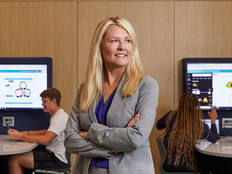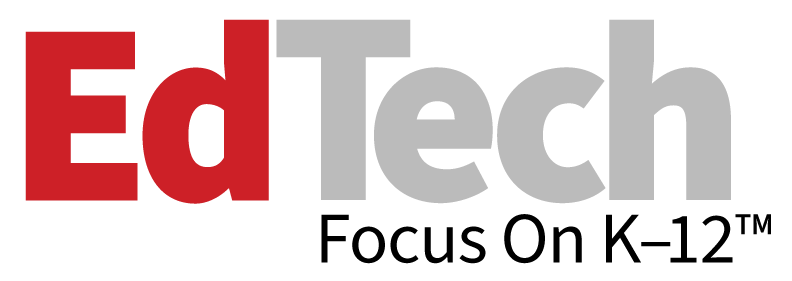Teacher Brings Science to Life with Technology
This year's Hilda E. Taylor Award winner brings science lessons to life in her classes. Learn how she does it in a special Web-only, expanded profile. In another report we find that community support for classroom technology leads to increased budgets for IT.
Keeping the Spirit of Teaching Alive
On Sept. 11, 2001, Hilda Taylor, a sixth-grade teacher at Leckie Elementary School in Washington, D.C., was en route to a marine sanctuary study project in California's Channel Islands with a small group of students when she perished aboard the hijacked Flight 77 that crashed into the Pentagon.
Yet the educator's spirit lives on in the Hilda E. Taylor Award, given annually by the JASON Foundation for Education, an Ashburn, Va.-based nonprofit organization dedicated to providing experience-based science and math curricula and professional development for grades four through nine.
Taylor was a longtime participant in the foundation's JASON Project, a curriculum that combines technology-rich tools, multimedia content, and an inquiry-based approach to encourage students and teachers alike to become lifelong learners in science and math. For eight years, Taylor engaged her students in field studies around the world as part of the project and conducted professional development workshops for hundreds of fellow teachers. The foundation's annual award was created in her name to honor teachers who, like Taylor, inspire students with exemplary instruction in and implementation of the JASON Project.
Bringing Science to Life
This year's award recipient is Krystyna M. Plut, who teaches science at Holy Trinity Catholic School in Grapevine, Texas. She credits the JASON Project with helping her bring bona fide science lessons to life within her classroom.
"The curriculum is so neat because it deals with real-life science issues," explains Plut, who has taught for 18 years. "There are scientists working in the field who are doing the same things the students [are studying]."
JASON's award-winning supplementary curricula—developed with leading scientists and educators—strive to provide deep learning experiences using a hands-on inquiry program that mirrors the work of real researchers. Based on national model standards and relying on technology-rich tools, the program offers teachers a vehicle to implement innovative content and instructional practices within the classroom to make science real and relevant.
Using JASON's digital laboratories, Plut's fourth- and fifth-grade students research issues, hold debates in class, and hone their skills in negotiation, compromise and communication. A recent experiment had the young scientists planning the best tactical approach to save New Orleans from a contrived hurricane in 2050. As part of the lab, students were tasked with investigating how various local stakeholder groups would be impacted by the event, including environmentalists, hunters, trappers and fisheries.
"The students assumed the roles of the stakeholders and had to debate what projects to complete and have everybody agree on them," Plut explains. "They had to run the simulation many times and see what projects worked best.
"During the debate, they had to make concessions and persuade each other to vote for the project, and each class came up with different compromises. [The JASON curriculum] teaches them that they all have to work together to find a solution and that anything they do will have an impact on the environment."
In addition to the digital labs, Plut's students also rely on extensive Internet research, PowerPoint presentations and other technological tools to complete their assignments. And once they walk into her classroom, they embrace an entirely new role.
"When the fourth-graders first come in, I tell them that if they are in my class, they are not children; they are scientists," says Plut.
Furthermore, while Plut's instruction is alive with the sounds and sights of science, one study aid that you won't find in her classroom is a textbook.
"I don't use any at all," she reports. "The kids really like that. I try to make them realize that science is not just something you find in a textbook, but something you encounter in the environment every day."
Plut's engaging classroom instruction will be further enhanced this year: Part of her award includes a $1,000 grant for JASON activities, as well as airfare, registration and hotel expenses for the foundation's annual conference, where Plut will receive supplemental professional development sessions and share her teaching techniques with peers from around the globe.
"JASON is a wonderful program," Plut enthuses. "If it weren't for the curriculum, I wouldn't still be a teacher. I learn something new each year, and I become enthusiastic … and then the children, in turn, become enthusiastic."
"Krystyna exemplifies all the qualities that Hilda brought into her classroom," says Kathy Coffey, leader of the JASON Teacher Advisory Council Committee for the award. "It's through wonderful teachers like Krystyna that the memory of Hilda lives on."
Plut acknowledges that the award is one of the highlights of her career. "The best reward for me is when students say that I have inspired them or turned them on to science," Plut reveals. "However, it's nice to be recognized by a professional institution, too. I'm glad that the foundation is granting this award to [teachers] who are following in [Hilda Taylor's] footsteps."
—Melissa B. Tamberg
Young Scientists Shine
In its second appearance at the International Young Physicists Tournament, the U.S. team finished in second place. From July 14-21, 2005, in Winterthur, Switzerland, the U.S. team duked out five rounds of “physics fights” for a second-place tie with Belarus.
Dating back to 1987, the research-based competition examines both theoretical and experimental physics topics and brings together 25 national high school teams from 23 countries. Each team researches 17 challenging problems during the year and then presents and supports their findings in the annual summer tournament.
For more information, visit www.iypt.org and www.usaypt.org.
Community Support for IT
There is a correlation between community support for technology and whether a school district reports increases or decreases in IT budgets.
Community support for classroom technology (percent today compared to three years ago):
More supportive
Total: 53 percent
Districts reporting budget increases*: 70 percent
Districts reporting budget decreases*: 30 percent
Same
Total: 29 percent
Districts reporting budget increases*: 18 percent
Districts reporting budget decreases*: 33 percent
Less supportive
Total: 18 percent
Districts reporting budget increases*: 11 percent
Districts reporting budget decreases*: 38 percent
(* Because of rounding, the amounts may not equal 100 percent)
Source: Grunwald Associates
Give Credit Where Credit Is Due
End the confusion about Web site citations and lower the chances of plagiarism. A new feature on the Answers.com answer-based search engine allows for easy citing of sources by creating bibliography entries at the click of a button. Fully formatted citations in a number of styles, including MLA (Modern Language Association) and Chicago (based on The Chicago Manual of Style) are available. It’s your choice. To find out more, visit www.answers.com.
Classroom Supplies
On average, teachers spend almost $1,200 of their own money buying classroom supplies each year, according to an online survey conducted by the Washington, D.C.-based National Education Association in fall 2004. To remedy that situation, SHOPA Kids In Need Foundation provides supplies to kids who need them.
Kids In Need Resource Centers throughout the United States distribute free school supplies to disadvantaged students and are open to teachers in low-income schools that meet certain criteria. About 65,000 educators and 1.1 million students benefit from the centers.
For more information, visit www.shopa.org/shopa_foundation.







